Search the Special Collections and Archives Portal
Search Results
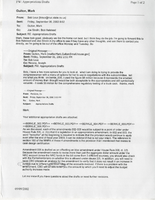

Photograph showing a production of Pzazz! 70 staged by Donn Arden, Desert Inn Hotel, Las Vegas, circa 1970
Date
1969 to 1971
Archival Collection
Description
On a production stage decorated with gold platforms and white fog, entertainers perform Act 2: "Hollywood and All That Jazz," Scene 1: "Halo Hi-Jinx" of the show Pzazz! 70 staged by Donn Arden at the Desert Inn Hotel, Las Vegas. Male and female performers pose across the stage as a crowd of people watch from below. While the female dancers are dressed in sparkling, gold two-piece costumes dripping with strings of silver beads and a matching pink headpieces, the male performers are wrapped in twinkling strings of gold beads with a matching gold g-strings and pink capes.
Show Name: Pzazz! 70
Performance Name: Hollywood and All That Jazz: Halo Hi-Jinx
Show Name: Pzazz! 70
Performance Name: Hollywood and All That Jazz: Halo Hi-Jinx
Image
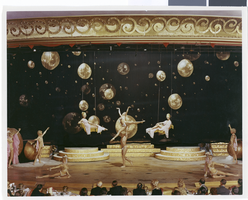
Photograph showing a production of Pzazz! 70 staged by Donn Arden, Desert Inn Hotel, Las Vegas, circa 1970
Date
1969 to 1971
Archival Collection
Description
On a production stage decorated with gold platforms and white fog, entertainers perform Act 2: "Hollywood and All That Jazz," Scene 2: "The Golden Galaxy" of the show Pzazz! 70 staged by Donn Arden at the Desert Inn Hotel, Las Vegas. Male and female performers pose across the stage as a crowd of people watch from below. While the female dancers are dressed in sparkling, gold two-piece costumes dripping with strings of silver beads and a matching pink headpieces, the male performers are wrapped in twinkling strings of gold beads with a matching gold g-strings and pink capes.
Show Name: Pzazz! 70
Performance Name: Hollywood and All That Jazz: The Golden Galaxy
Show Name: Pzazz! 70
Performance Name: Hollywood and All That Jazz: The Golden Galaxy
Image
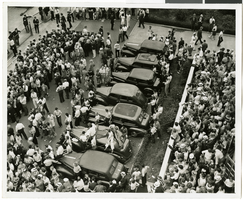
Photograph of crowds at Floyd Bennett Airfield, New York, July 1938
Date
1938-07-14
Archival Collection
Description
The black and white, overhead view of Howard Hughes and his crew after completing his Around the World flight at Floyd Bennett Airport, New York. Description printed on photograph's accompanying sheet of paper: "On hand to welcome Hughes and his gallant crew New York City-- Looking down on a segment of the huge crowd that gathered at Floyd Bennett Field, July 14th, to greet the arrival of Howard Hughes and his picked crew of four at the end of their record-smashing flight around the world. The tops of the cars jamming the parking spaces were used as coigns of vantage. Credit Line (ACME) 7/14/38 (SS)"
Image
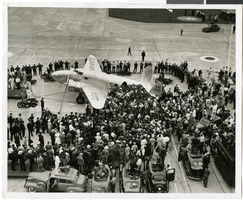
Photograph of crowds at Floyd Bennett Airfield, New York, July 14, 1938
Date
1938-07-14
Archival Collection
Description
The black and white view of Howard Hughes' Lockheed 14 aircraft after performing its final landing on the Round the World flight at Floyd Bennett Airport, New York. Description printed on photograph's accompanying sheet of paper: "Journey's end for world fliers! Floyd Bennett Airport, N.Y.--- The plane which carried Howard Hughes and four companions on their dramatic dash around the world, is shown shortly after it landed here at the conclusion of the flight. Crowds swarmed about the craft as the fliers hesitantly prepared to leave the ship. 7/14/1938."
Image
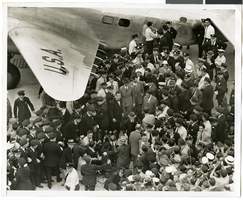
Photograph of crowds at Floyd Bennett Airfield, New York, July 1938
Date
1938-07-14
Archival Collection
Description
The black and white view of Howard Hughes exiting his Lockheed 14 aircraft after performing the final landing on the Round the World flight at Floyd Bennett Airport, New York. Description printed on photograph's accompanying sheet of paper: "Telling the world about the record-smashing flight. New York City--Under the giant wing of the huge Lockheed plane, radio men set up their microphones so that Howard Hughes and his gallant crew of four can send a few words of greeting to the world over the air waves after landing at Floyd Bennett Field on their record-smashing flight around the world. Credit Line (ACME) 7/14/38"
Image
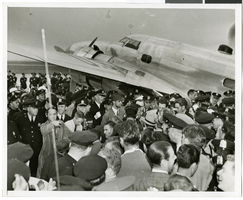
Photograph of crowds at Floyd Bennett Airfield, New York, July 1938
Date
1938-07-14
Archival Collection
Description
The black and white view of Howard Hughes and his crew exiting the Lockheed 14 aircraft after they performed the final landing on the Round the World flight at Floyd Bennett Airport, New York. Description printed on photograph's accompanying sheet of paper: "Crowds jammed on field around Hughes' plane New York City-- Police holding back part of the wildly cheering crowd of 30,000 persons from the plane of Howard Hughes after Hughes and his crew of four had landed the faint Lockheed at Floyd Bennett Field, July 14th, after the record-smashing 3 day, 19 hour, 14 minute flight around the world. Credit Line (ACME) 7/14/38 (SS)"
Image
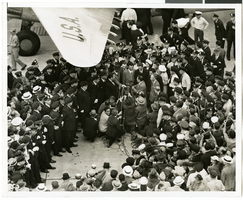
Photograph of Howard Hughes and crowds at Floyd Bennett Airfield, New York, July 14, 1938
Date
1938-07-14
Archival Collection
Description
The black and white view of Howard Hughes and his crew being surrounded by crowds as they exit the Lockheed 14 aircraft after finishing the Around the World flight at Floyd Bennett Airfield in New York. Description printed on photograph's accompanying sheet of paper: "Telling the world about Hughes' record flight. New York City-- Radio men setting up their microphones in front of the crew of Howard Hughes great Lockheed plane so that Hughes and his heroic crew could send a few words of greeting to the world over the air waves after their record smashing flight around the world. Credit Line (ACME) 7/14/38 (SS)"
Image
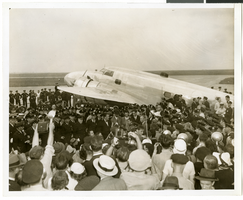
Photograph of Howard Hughes and crowds at Floyd Bennett Airfield, New York, July 14, 1938
Date
1938-07-14
Archival Collection
Description
The black and white view of Howard Hughes and his crew being surrounded by crowds as they exit the Lockheed 14 aircraft after finishing the Around the World flight at Floyd Bennett Airfield in New York. "Description printed on photograph's accompanying sheet of paper: A scene at Floyd Bennett Field as Howard Hughes and his crew landed after completing a round the world flight. 7-14-38 (Press Association)."
Image
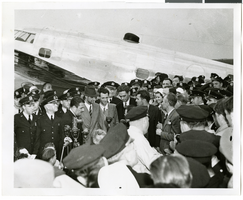
Photograph of Howard Hughes and crowds at Floyd Bennett Airfield, New York, July 14, 1938
Date
1938-07-14
Archival Collection
Description
The black and white view of Howard Hughes and his crew being surrounded by crowds as they exit the Lockheed 14 aircraft after finishing the Around the World flight at Floyd Bennett Airfield in New York. Description printed on photograph's accompanying sheet of paper: "Hughes reception at Floyd Bennett Field 7/14/38 (Press Association"
Image
Pagination
Refine my results
Content Type
Creator or Contributor
Subject
Archival Collection
Digital Project
Resource Type
Year
Material Type
Place
Language
Records Classification
